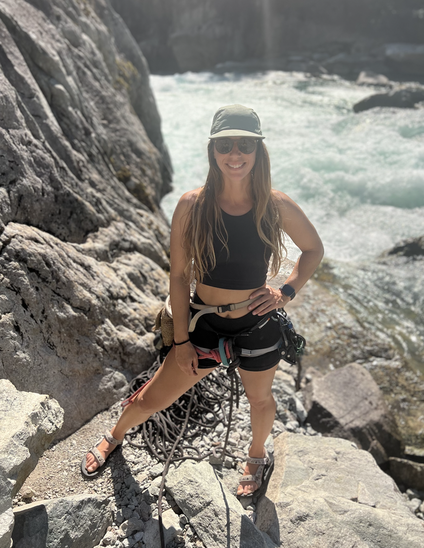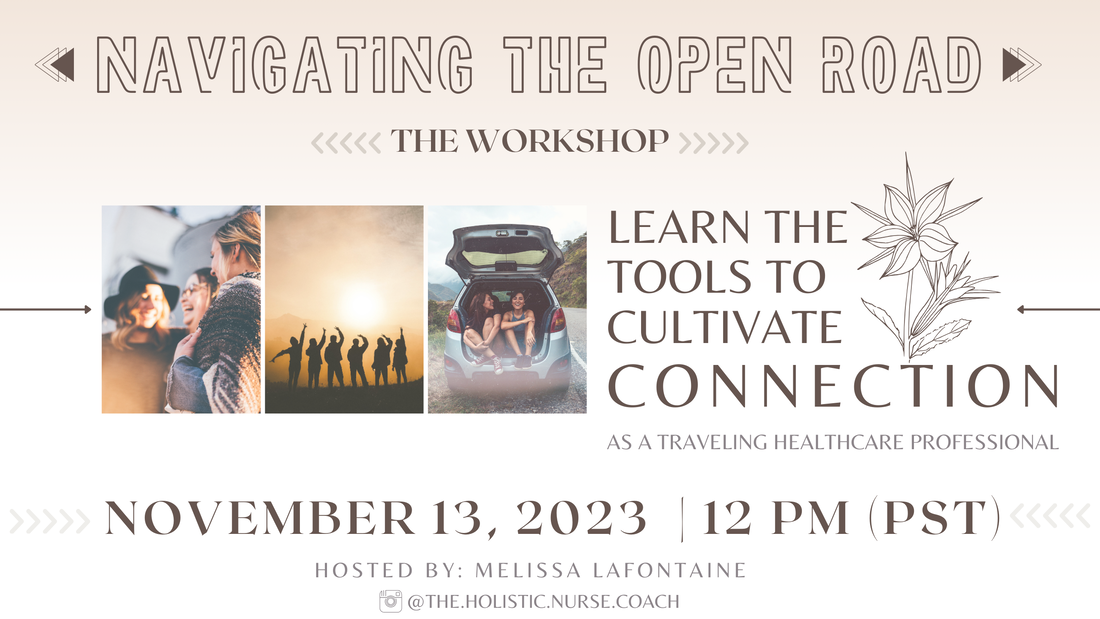|
Life as a traveling health care professional is thrilling, filled with new experiences and endless exploration. However, amidst the adventure, many bear the same heavy weight – a feeling of loneliness and missing out while on the road. A nomadic career means leaving behind social circles, friends, family, and the comfort of familiarity; leading to depression, anxiety, and isolation. As a fellow travel nurse and board-certified Holistic Nurse Coach who specializes in working with travelers, I have witnessed the burden of loneliness on many travelers. With a lack of resources available for helping travelers overcome this, I created this guide to help you cultivate connection while living a life on the road. The Weight of Loneliness
Travelers face a form of loneliness that is unique to the profession beyond just who to call when their car breaks down. These include feeling like outsiders among staff, being the sole traveler in a location, limited local events in the smaller towns, the fear of missing out on loved one’s milestones back home, and constant disruptions in routine due to the frequent relocations. We, as humans, are hard-wired for connection. In our caveman era, a lack of connection meant you were left to starve and likely be hunted by predators. Fast-forward to now, this instinctual need to connect isn’t necessarily a death sentence, but it is as fundamental to our well-being as a healthy diet and adequate sleep. Loneliness, whether real or perceived, has a swift impact on our mental and emotional health, decreasing brain white matter which is associated with critical thinking and emotional regulation. Our brain is SO powerful, even the thought “I am lonely” or “I feel isolated” creates the reality in our head that we are. The remarkable concept of neuroplasticity shows that our thoughts, beliefs, and habits can reshape, not only our brain structure, but our lived experiences! Harnessing the power of neuroplasticity, my tips will help you combat loneliness, cultivate connections, and create the fulfilling traveling lifestyle you desire. Master your Mind to Cultivate Connections Our greatest source of suffering are the stories we tell ourselves. We construct stories around EVERYTHING in our lives. Picture your thoughts as little authors narrating every event in our lives as they happen. Many people underestimate the power of our thoughts, believing we are passive observers of life. However, life isn’t a verb, just happening to us; rather, we shape our lives through these thoughts or stories we tell ourselves. Events themselves are neutral; it’s our meaning we attach to them that influence our responses. A common story among travelers is “I’ll only be here for three months, why bother trying to make friends?” This mindset closes the door to potential connections, perpetuating the vicious cycle of loneliness and isolation. A more productive story would be that you never know who you will meet and how they can transform your life! Leaving in three months doesn’t prevent you from having an incredible and adventurous time with the people you meet, or from staying in touch after you’ve moved away. I met my best friend while traveling, and we continued our traveling journeys together to the next place— where I then met my partner. The same open-mindedness that serves you in your career can also help you form connections. Our thoughts and stories create our emotions, which drive our actions. By adjusting your thoughts about connection while on the road, you can transform how you engage in your relationships and friendships. If you change your story, you can change your life. These five tips focus on internal mindset shifts to help you foster meaningful connections: 1. Change the story you’ve created about yourself. If you enter social situations with self-defeating thoughts like “I’m not fun,” or “I don’t fit in with these people,” Then, it’s no surprise that you might struggle to build the friendships or relationships you desire. Your thoughts act as the fuel for your connections. Are you fueling them with insecurity and doubt, or with self-compassion and confidence? Recognize that these stories and feelings of being lonely or an outsider can reinforce these negative thoughts. 2. Change the story you’ve created about others. Assume people will like you! Research shows believing that people will like us makes us more open, friendly, and more likely to let our guard down. While not everyone will like you—which is perfectly normal, turns out we’re not for everyone. However, the belief that they will benefits you, allowing you to keep showing up and cultivating connections with people who do like you (#WIN). Additionally, question your stories of others’ behavior. We tend to see people’s behaviors, not as they are, but in a way that fits the narrative we tell ourselves—leading to disconnection. Someone canceling doesn’t mean they dislike you. Our brains make us the center of attention, tending to personalize other’s actions. 3. Be Present Being present in the moment allows you to focus on your own actions and choices, rather than getting lost in the sauce of your thoughts. How do you want to show up as a friend or partner right now? Instead of expending all of your mental energy on what others are thinking, feeling, and doing—redirect this energy towards becoming the friend, partner, or person you aspire to be. When we’re absorbed in self- judgment, we may overlook the person standing in front of us. Curiosity fosters authentic connections and opens the door to more meaningful conversations. If you catch yourself slipping into thoughts about yourself while around others, ask yourself “What is something I don’t know about this person that I would love to find out?” 4. View Rejection as Redirection Embrace rejection as a part of building connections. If you fear being disliked or rejected, you may talk yourself out of pursuing meaningful connections. Using dating as an example here, many people give up after a few unsuccessful dates, assuming something is wrong with them. However, rejection doesn’t signify your lack of likeability or worthiness—it merely indicates a lack of compatibility with that person. Rejection is redirection to continue searching for those who align with you. When we feel rejected, we go back to our primitive brain - seeing it as a life-threatening event.We create an unneeded emotional pain as the result of our stories we create about rejection, not the rejection itself. It’s crucial to recognize the core issue lies in how we reject ourselves when we experience rejection from others. 5. Fill Your Own Cup As healthcare professionals, we are natural givers. We’ve all heard the age old saying—you can’t pour from an empty cup. And why would you want to? Self-care isn’t a luxury, it is a necessity, especially for cultivating connection with others. Self- care fosters self-esteem, sending ourselves the powerful message that we are deserving of love. Simply put: our relationship with others is a mirror for our relationship with ourselves. Aside from fostering connections, self-care builds emotional resilience and coping strategies—allowing us to manage the unforeseen weather storms that will inevitably sneak up on us while living life on the road. Uncovering the Roots of Disconnection These may seem like simple and obvious steps, but many of us nurses, and healthcare workers, live in a perpetual state of an overactive nervous system. This may show up in different ways such as: high anxiety, irregular sleeping patterns, brain fog, attention problems, and emotional dysregulation. While the fight or flight instincts are great for those life-or-death scenarios in our job, they tend to spill over into our daily lives with our mundane tasks. Living in this constant heightened nervous system state has consequences and can take a toll on your mind and body over time— showing up as autoimmune disease, hormonal imbalances, and is a breeding ground for anxiety and a negative mindset. This sets the stage for negative self-talk, reinforcing our primitive brain to make stories to protect us and prevent us from living in our true authenticity, where we need to be to attract those genuine connections. Subsequently leading people into a perpetual self-sabotage cycle and affecting our interpersonal relationships with others. I am hosting a FREE workshop to better equip you with the tools to achieve the internal mindset shifts listed above and nervous system regulation (plus 5 bonus tips) to cultivate meaningful connections in your life. Join me on November 13th at 12pm PST to develop healthier personal and professional relationships, regain emotional balance, and nurture your well-being. About the Author Melissa LaFontaine is a board-certified Holistic Nurse Coach, Travel Pediatric ER Nurse, Breathwork Facilitator, and Certified Yoga & Meditation Instructor. She specializes in guiding traveling healthcare professionals through the challenges and uncertainty of the traveling lifestyle, overcoming burnout, and healing from both personal and professional trauma through somatic and mindset practices. Want a more in depth look at how to cultivate connections on the road? Join her workshop to learn the tools, free to MedVenture users, here (link: mlholisticcoaching.cohere.live/contribution-view/652d726cd6998869e4d4fae9/e1a96380-9504-4955-8632-b16e489dfad3/about) For more tips and tricks, follow her on Instagram: @the.holistic.nurse.coach
0 Comments
Leave a Reply. |
Archives
October 2023
|



 RSS Feed
RSS Feed


